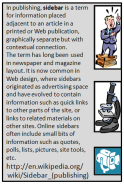
Plagiarism is "to steal and pass off (the ideas or words of another) as one's own" or to "use (another's production) without crediting the source".[Merriam-Webster]
In some cases, this legitimate class of software that is intended to help you find and organize information has been subverted for the sale of plagiarism helpers — software that helps you pull information directly from numerous sources on the web and "write" a paper in a few minutes.
The idea is that after changing a few words here and there, the instructor won't be able to tell that the paper is a jigsaw puzzle of sources. Plagiarism detection software is good; it can find the source by similarities. Try this with a simple Google search. Just copy the entire sentence below, which is a modified version of a Wikipedia page, and paste into Google as a string of keywords. The parts changed are in red font. There was also a deleted phrase: "the sectors of". (And, keep in mind the constant editing that happens on Wikipedia.)
New morals from the 18th century have been institutionalized and enforced to a high degree in academia and journalism, where plagiarism is now considered academic dishonesty and a breach of professional ethics.
Google returned the actual source as the first hit when I tried this.
A jigsaw puzzle, when completed, isn't exactly a work of art. Getting all the parts to fit together seamlessly is probably more work, and certainly more boring, than just writing the paper.
Actually, quite the opposite is true. In the US, once a document (picture or whatever) is in fixed form, as on a web page, it is copyrighted. But, that is a legal issue and misses the point. Plagiarism is about academic dishonesty. The "theft" is of ideas and sometimes even the specific expression of those ideas.
Apparently, because (potentially) a lot of people collaborated to write something, some students think they can quote it without citing it. Not so — you didn't write it; not even if you were a contributor. And, Wikipedia itself only allows use of its content under various licenses, which require citing the source and including every major contributor. (They prefer a link to the original on web pages, which is what is done throughout these notes.)
Software for plagiarism detection is easily available. At SRU, this is as simple (for the Prof) as setting up a D2L dropbox for the assignment. The software runs automatically and the Prof gets both an overview and a detailed breakdown of sources.
It is, but I'm not going to start lecturing here. I'll just point out that at most universities, including SRU, punishment ranges from an 'F' on the assignment or in the course, to suspension or even expulsion. Generally, it becomes part of your official academic record. (On the positive side, you will have a ready conversation topic when you are interviewing for jobs.)
Somewhere in elementary school, you actually created reports by piecing together various sources – probably. (Which is what the software described above helps you to do.) You should have learned how to read, use, and properly cite sources in ensuing years. If not, google "avoiding plagiarism"; your school may have a Writing Center that can help; and, your library likely provides guidance.
The bottom line is, if you didn't cheat, why would you need to do this?
Of course, if you bought a paper (guaranteed original), you have to wonder how they can make a profit. It's usually re-hashed (What are you going to do, sue them for cheating you?), put together with an "Internet research tool", or written by someone that couldn't get any other job. Good luck with that — especially when the prof wants your draft and annotated bibliography. In this case, running it through plagiarism detection may save you embarrassment (at the least), but won't save you the money you paid.
I have often told students that if you copy an entire paper, put quotation marks around it, and cite the source, you can be accused of stupidity, but not plagiarism!
Do your own work and cite your sources.
